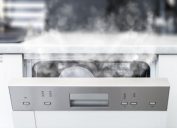17 Ways You're Using Your Kitchen All Wrong
Nix these habits to become a master in minutes.
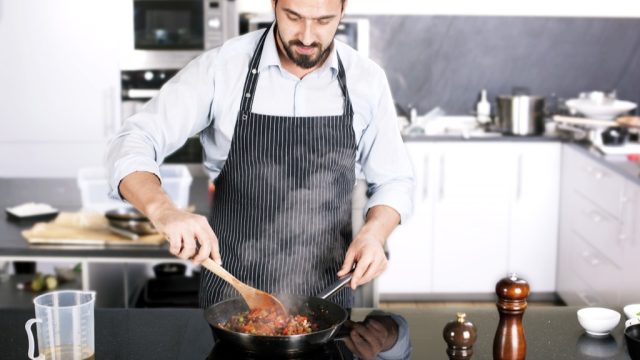
The average American spends more than four hours each week preparing, cooking, and cleaning up after meals. However, despite the long hours we log in the kitchen, many of us are still making countless mistakes that cost us time and money every time we tie our aprons on.
Unfortunately, these seemingly-minor mistakes can lead to serious consequences, from the minor to the potentially deadly. But the good news is you needn't be a professional chef to improve your kitchen skills in a hurry. We've rounded up 17 ways you're using your kitchen wrong, making it easy to improve your culinary game, keep your appliances working, and maintain your safety in the process. And when you want to know what really goes on behind the scenes in a professional kitchen, discover these 20 Secrets Chefs Won't Tell You.
1
Failing to preheat your oven
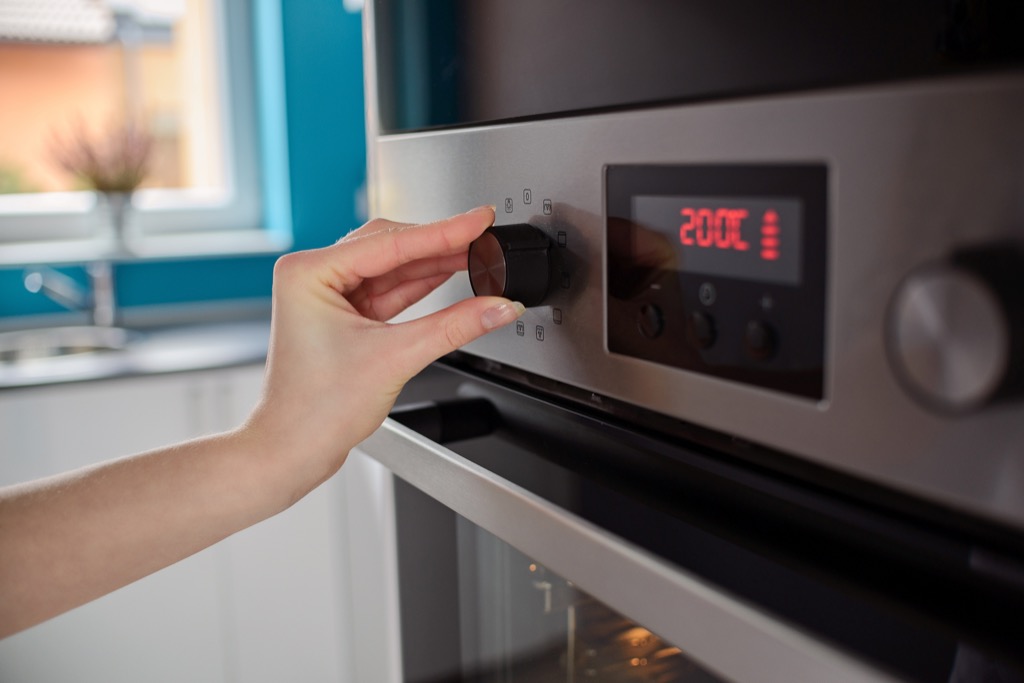
If you're not preheating your oven before putting your food in, you're doing yourself a disservice. According to research published in the Journal of the American Dietetic Association, not preheating ovens added unaccounted for extra cooking time to recipes, which can prove tricky for novice chefs, and may lead to either overcooked or undercooked food. For the best results, preheat your oven and adhere to the recommended baking times at first, adjusting slightly as you get more confident in the kitchen. And when you want to cook like a pro, memorize these 40 Dishes Everyone Over 40 Should Master.
2
Pouring grease into your sink
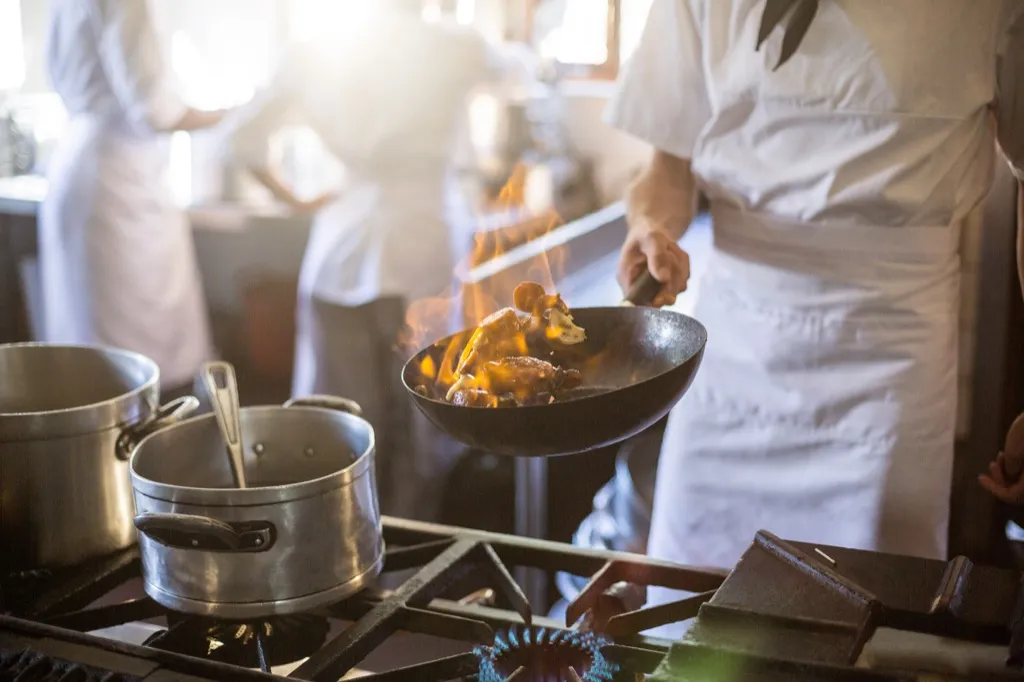
If you find yourself dealing with clogged sinks on a regular basis, a build-up of grease could be the problem. Grease that goes down your drain, whether it's a tiny plate's worth or a whole pan's worth, can solidify when it cools. This can cause a hard-to-dislodge buildup inside your pipes, and may lead to expensive repairs in the long run. Instead, wipe small amounts of grease off your plate and into a trash can or collect larger amounts in a jar to use for future recipes.
3
Preparing cooked and uncooked food next to each other
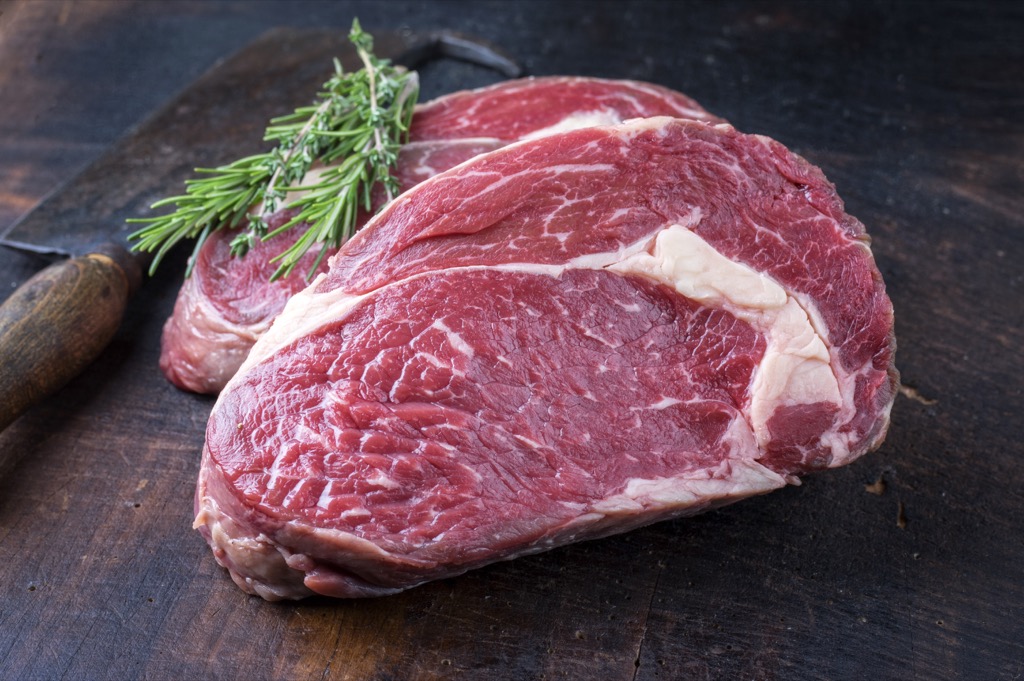
Slapping a slab of steak in a pan next to your almost-prepared veggies could put your health at risk. When you have cooked and uncooked food in close proximity to one another, you run the risk of cross-contamination that can make you sick. This is particularly true with meat, which can expose you to everything from salmonella to campylobacter jejuni. And when you want to avoid illness altogether, make sure you know these 20 Items in Your Home Making You Sick.
4
Storing your knives in a drawer
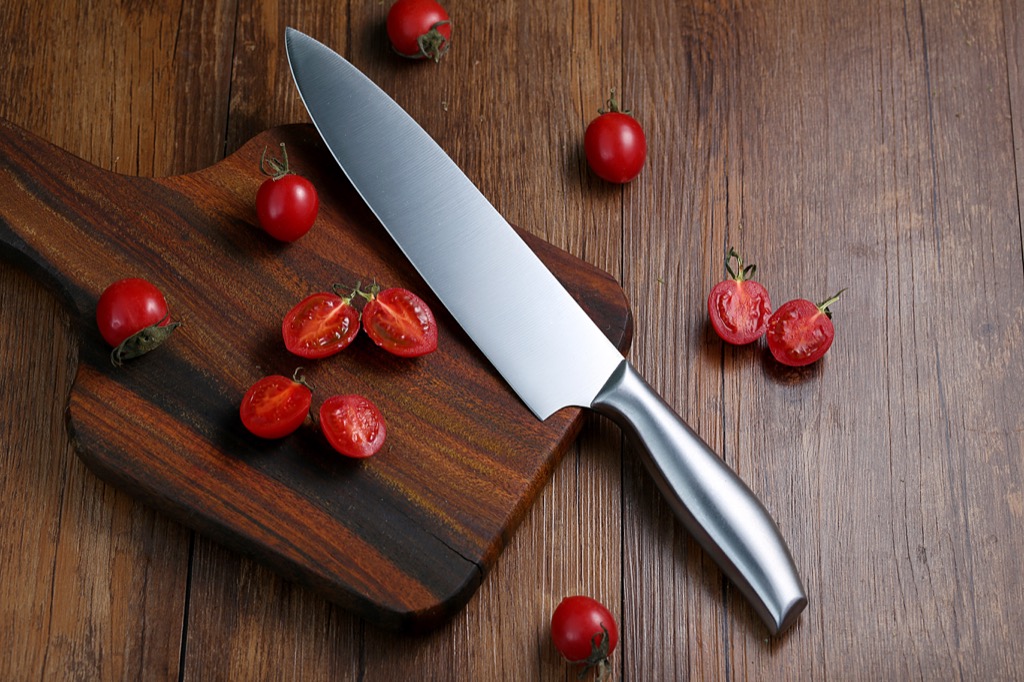
Storing your sharp knives in a typical kitchen drawer is as perilous for you as it is for your utensils. Not only does putting your sharp knives in a drawer mean that you're likely to accidentally cut yourself when you go to grab one, it also makes them less useful. When knifes are left to bang around in a drawer, they quickly become dull; instead, hang them from a magnetic rack and keep them sharp and usable for longer.
5
Cleaning your blender by hand
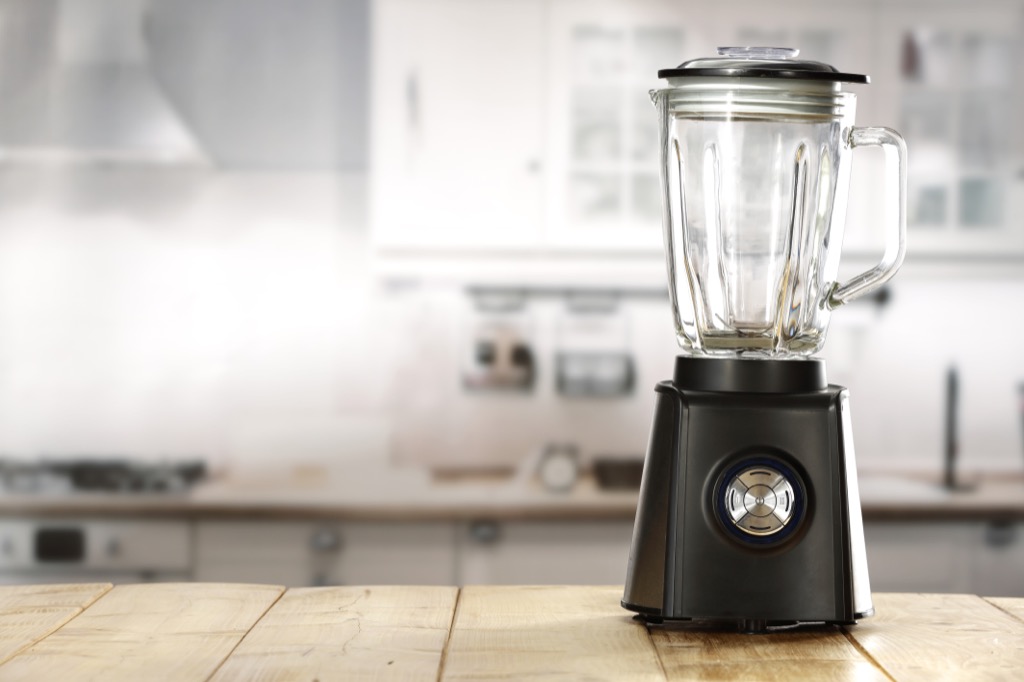
While cleaning your blender by hand may seem like the best way to get it spotless, it's a more perilous activity than you might imagine. First, there's the potential to completely eviscerate your kitchen gloves and fingers in the process. Second, there's a better way. Simply put a few drops of dish soap and some water in your blender and pulse it for a minute or so to get off any gunk that can't be simply rinsed away. Afterward, pop it in your dishwasher and your blender will emerge looking brand new.
6
Running hot water in your garbage disposal
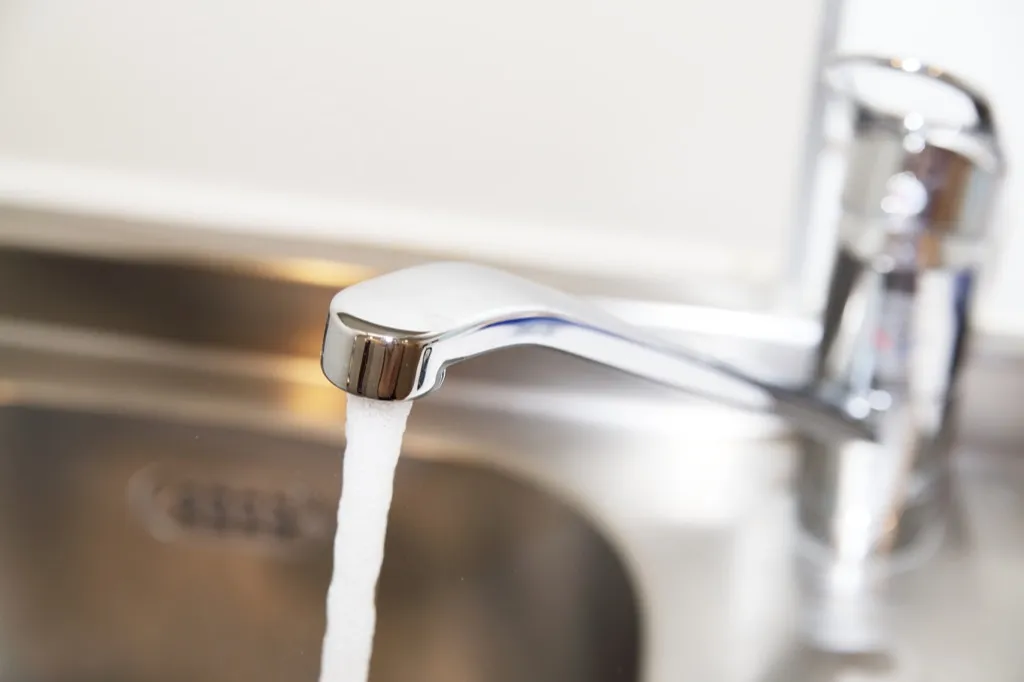
Hot may be your temperature of choice for cleaning dishes, but when it comes to moving food through your garbage disposal, you're better off keeping things cool. Hot water has a tendency to melt or loosen solid food, creating a paste that can eventually clog your disposal. If you need a little help moving food through your disposal, opt for cold water instead.
7
Not scraping your plates before loading the dishwasher
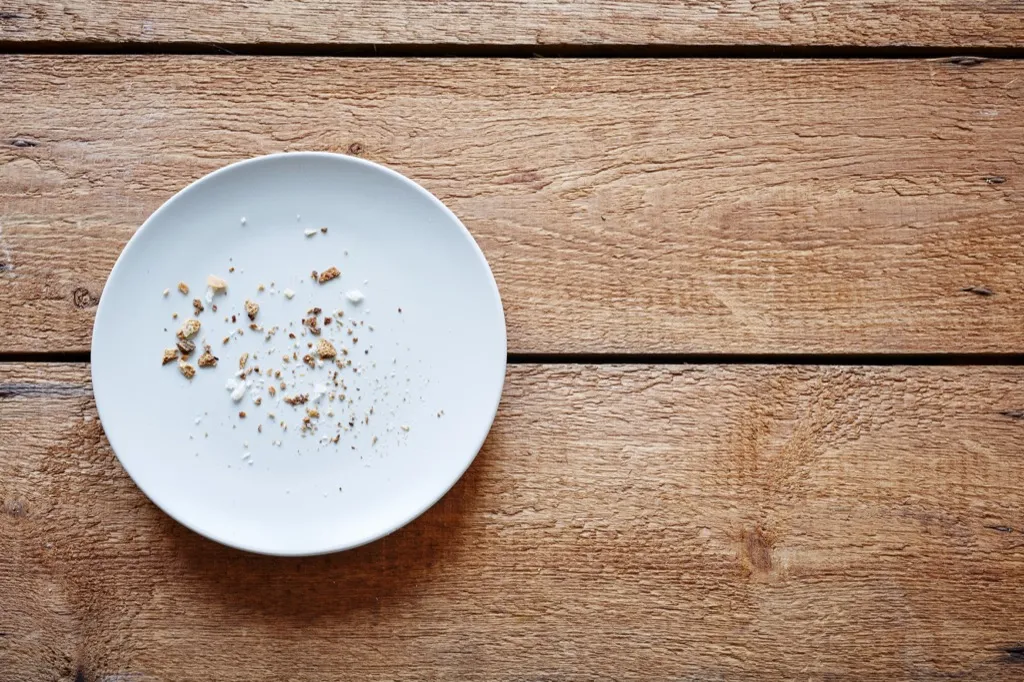
If you're putting dirty dishes directly into the dishwasher, you're only adding work to your metaphorical plate. Scraping your plates first will help keep pieces of food from landing on your dishes during the wash cycle and keep them from clogging your filters and hoses, as well. However, that doesn't mean you need to rinse your plates before they get washed—in fact, all pre-rinsing really does is waste water. And when you want to make your cleaning rituals more effective, This Is the Best Way to Load a Washing Machine.
8
Using your food processor and blender interchangeably
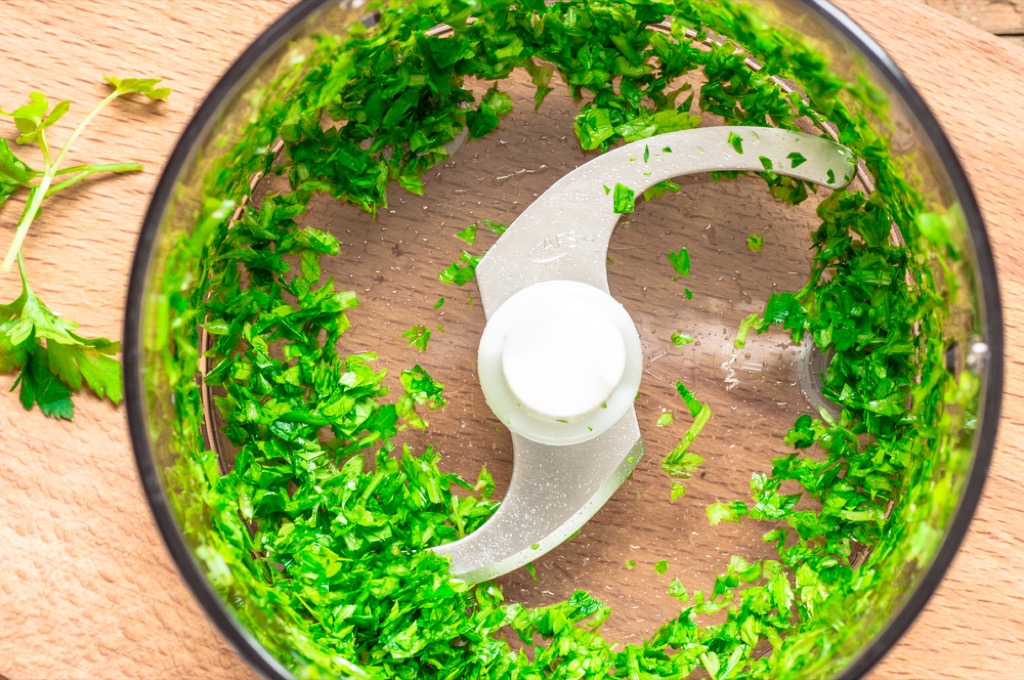
Your food processor and blender may have similar functions, but they're not interchangeable. Blenders are ideal for making viscous liquids, like smoothies and soups, while food processors are better-equipped to crush nuts, chop veggies, or make thicker sauces.
9
Not thoroughly scraping your grill before using it
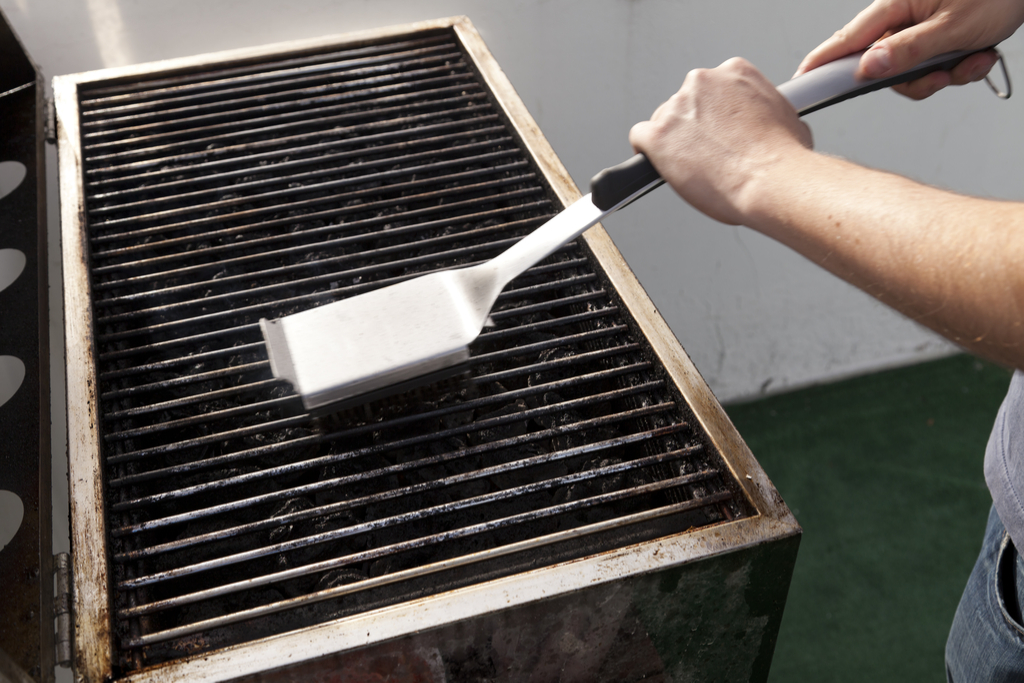
Think you can slap a steak directly onto a not-so-thoroughly scraped grill with no consequences? Think again. Not only will you wind up with charred bits of previous meals on today's dinner, you're also putting yourself at risk by doing so. In fact, according to the National Fire Protection Association, grills are responsible for 8,900 fires, 10 deaths, and $118 million in property damage each year, and the majority of grill fires were caused by improper cleaning techniques.
10
Opening your oven door while preparing meals
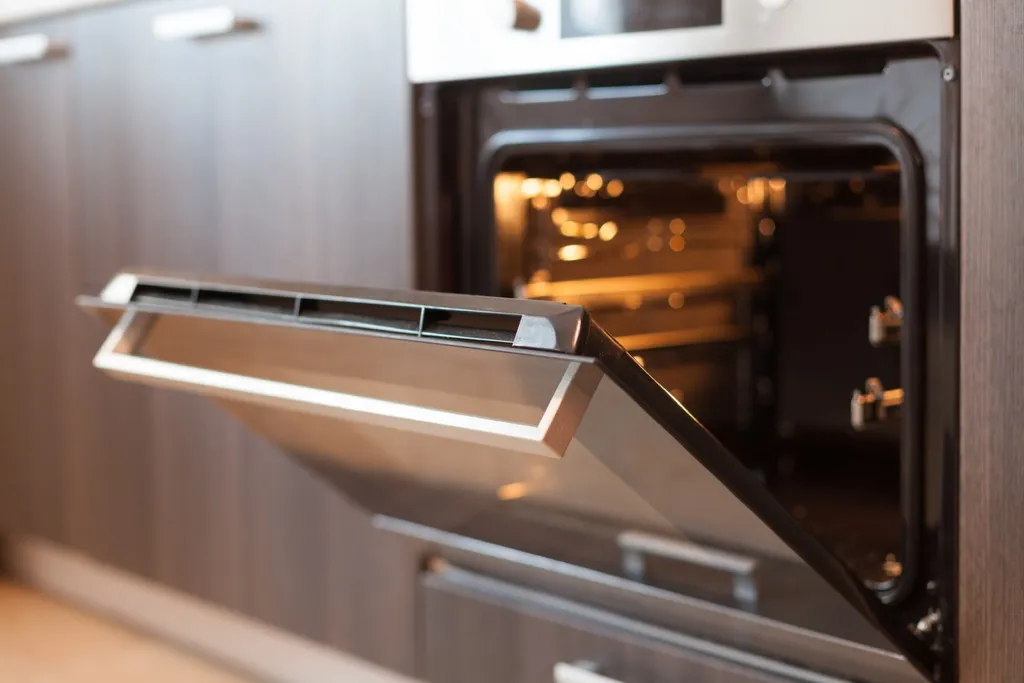
It may be tempting to check on your food throughout the cooking process, but doing so by opening the oven is only making things take longer. In fact, opening your oven to check on your food—particularly if you leave the door open as you check it—can result in a heat loss of up to 100 degrees. This means that not only will your food take longer to cook, it may even cook less evenly than if you'd left the door closed. If you can't wait, turn on the light in your oven and check your food's progress through the door.
11
Stacking your cast iron pans
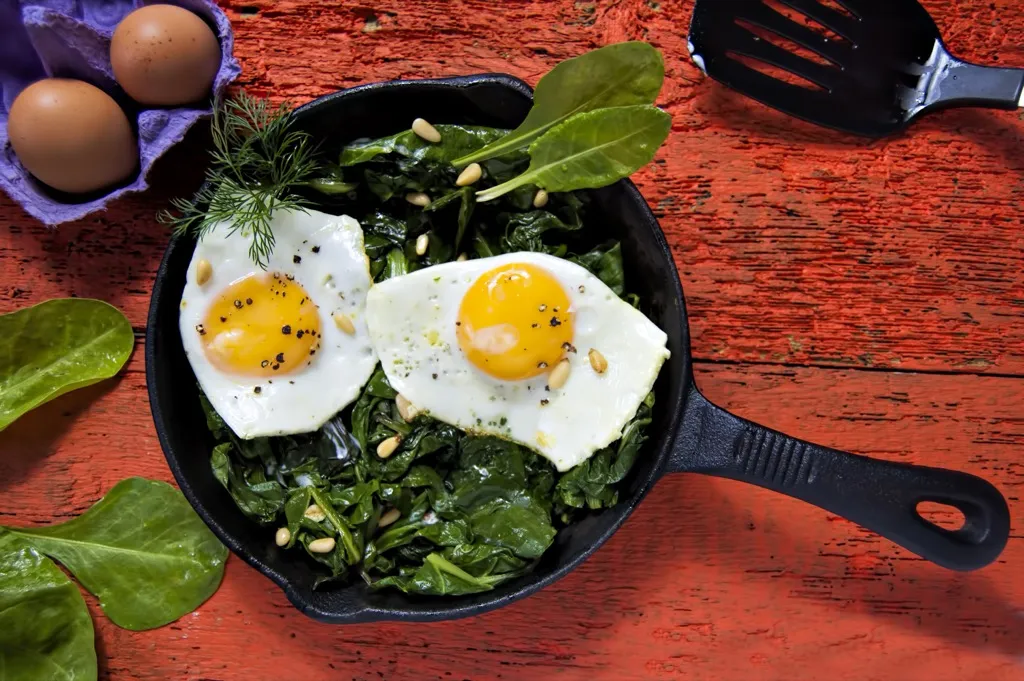
If you can stack your plates, you can stack your pans, right? Not exactly. When you stack cast iron pots and pans on top of one another, you're risking causing serious scratches and nicks in their seasoned surfaces, meaning they're less likely to last a long time. If you need to stack your cast iron, place a dish towel between pans to keep scratches at bay.
12
Arranging your dishwasher wrong
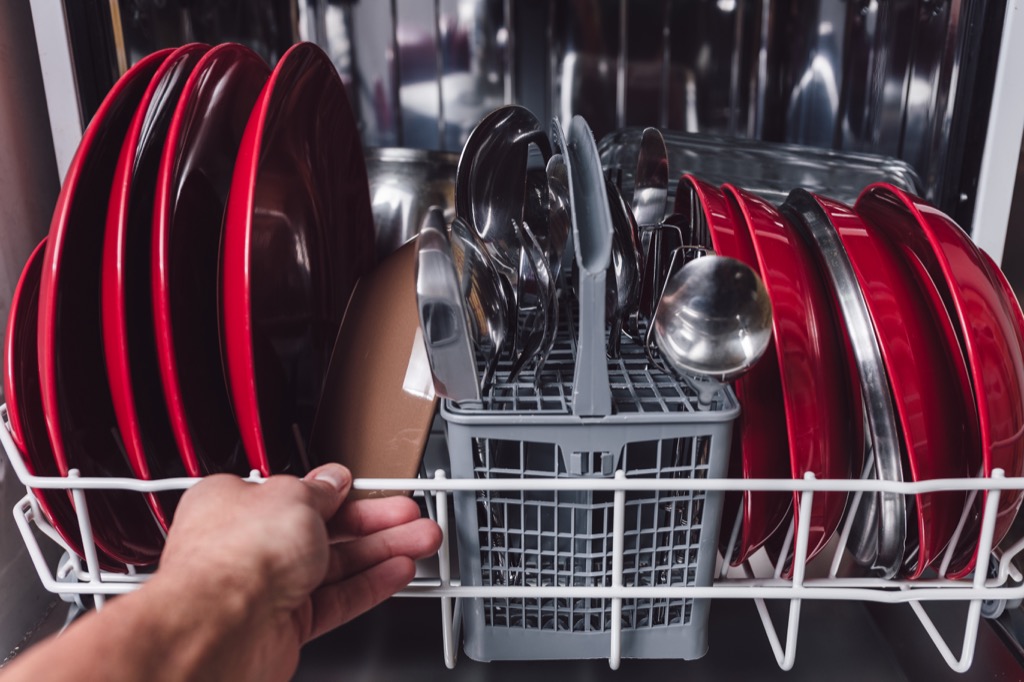
The racks on your dishwasher aren't interchangeable. If you're cleaning plastic cups or reusable containers, put them on the upper shelf to prevent your dishwasher's heating coil from warping them. Leave items like stemware and sharp knives out to hand-wash so that they don't break or dull during the wash cycle. According to one study iout ofn the United Kingdom, placing dishes with protein residues on the sides of the dishwasher's bottom rack will get them cleanest, while placing dishes with carbohydrate residue closer to the jets in the center will leave them sparkling.
13
Loading your blender in the wrong order

Making a perfect smoothie isn't as simple as loading everything into your blender at once. If you want your blender to perfectly combine your ingredients, start with liquids first, then small solids, then larger pieces of fruits or vegetables, then ice.
14
Storing food on the counter while you cook
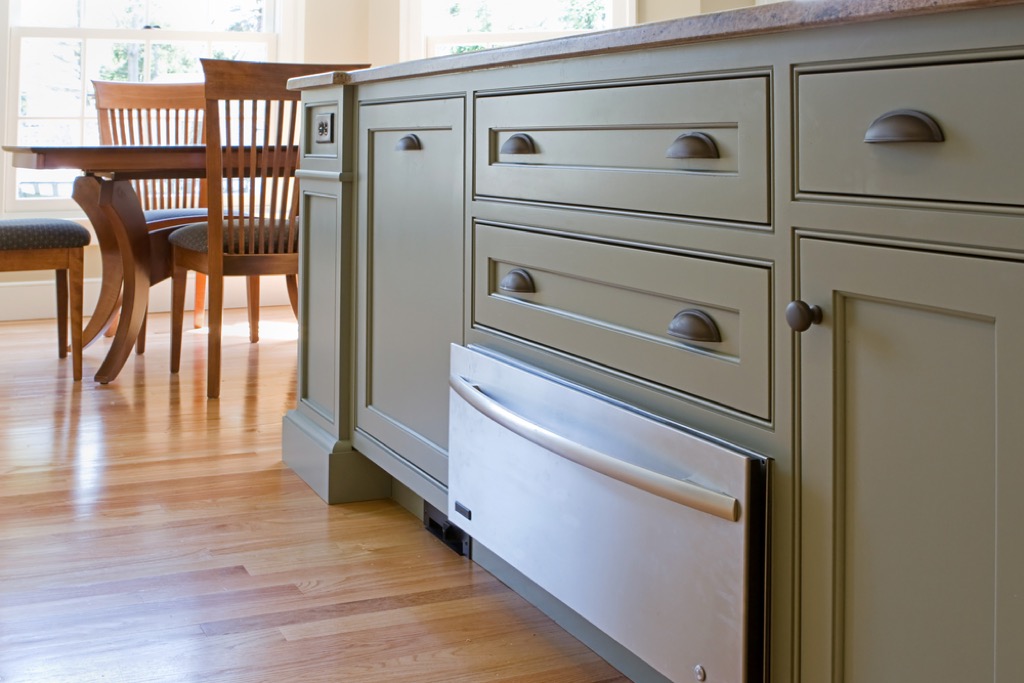
If you think that placing a dish towel over your freshly-cooked food is the best way to maintain its temperature while you wait for other dishes to heat, you're sorely mistaken. Instead, place your cooked food in the drawer at the bottom of your oven, where they'll stay nice and warm—just make sure you move out those odds and ends you've been storing in there first.
15
Using the oven for small meals
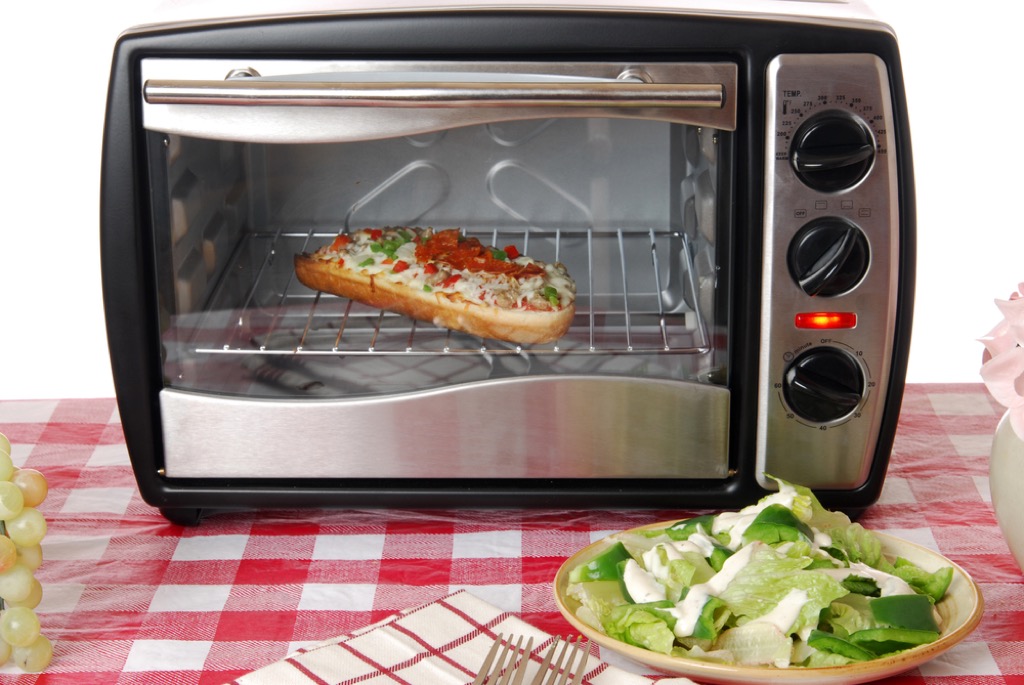
Using your oven to cook small batches of food is as inefficient as it is wasteful. Your toaster oven heats up faster and requires less preheating time, meaning that your total cooking time will be slashed.
16
Checking on food in your slow cooker

Much like opening the door to your oven, taking the lid off your slow cooker to see how they're coming along can have a deleterious effect. Removing the slow cooker's lid lets out a significant amount of heat, meaning your meal will take more time to prepare in the long run.
17
Storing certain foods in your fridge door
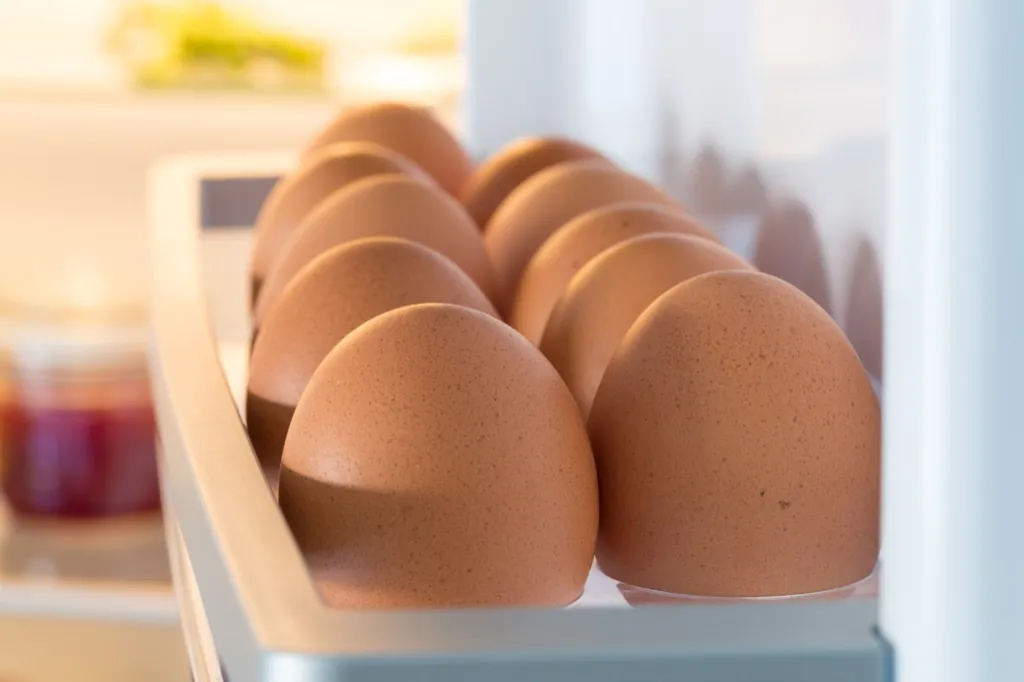
All parts of your fridge aren't created equal when it comes to storing food. Your fridge door tends to get exposed to warm temperatures for longer periods of time than the center of your fridge, meaning it's not an ideal place to store delicate items like meat, eggs, or dairy. And for more tips on how to master the kitchen, learn the 20 Kitchen Tools You're Using All Wrong.
To discover more amazing secrets about living your best life, click here to sign up for our FREE daily newsletter!

